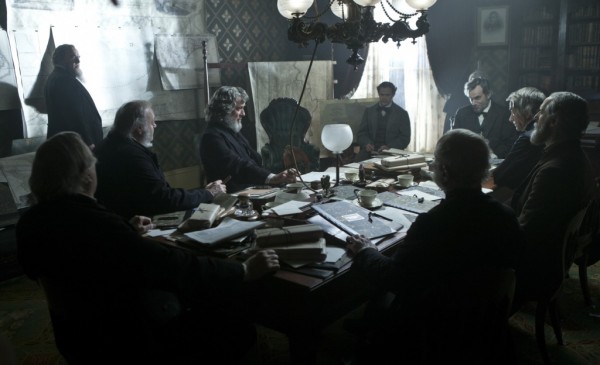
5/5 Review
When it comes to award-winning historical epics, there are two major periods filmmakers focus on: The American Revolutionary War, and the American Civil War.
Most of the time the focus is on wartime actions in these historical films, and they often include various battles and the resulting devastation.
However, Spielberg has decided to go the more political route with his approach toward his examination of the 16th president of the United States.
“Lincoln” stars Daniel Day-Lewis as Abraham Lincoln, with Sally Fields as Mary Todd Lincoln, and actors such as Tommy Lee Jones, David Strathairn, and Joseph Gordon-Leavitt rounding out the cast.
Rather than be your typical biopic, this film focuses on the Lincoln administration’s efforts to get the anti-slavery 13th Amendment voted through the perpetually divided House of Representatives.
The first thing I have to say about “Lincoln” is that it’s very “wordy”
Much of the film’s emphasis is on dialogue and various monologues.
There are several lines that feel like direct quotations, or are structured to sound like quotations. Some moments of clever wordplay and subtle humor can be found, as well as more humorous bits from the various political figures.
Another major thing I noticed was how the film attempted an allegorical analysis of the world of politics and the various backdoor dealings and bribery that are implemented in order to sway the congressmen to one side or another.
Keep in mind, this was during the time where the Democratic and Republican parties as we know them today were beginning to take form, with just as much partisan in-fighting as one saw during the fight for the Republican nomination little over a year ago.
It doesn’t glorify one party or another, but rather creates a parallel between the past and present
From a technical standpoint, “Lincoln” is put together pretty well. It very clearly shows that this film was made by a veteran filmmaker rather than many of the up-and-coming directors fighting for Oscars these days.
It’s shot in a very traditional style, with smooth dolly moves, expansive wide shots, and the various compositional techniques that students in the film department study to this day.
Most of the emphasis is placed on cinematography and dialogue, so there isn’t as much emphasis on music and additional sound design.
Most of the music is comprised of Civil War-era songs, classical music, and excerpts from various operas, with John Williams filling in the rest. There’s nothing too memorable from the original music, and the other types of music are mostly diegetic, coming from various extras and on-camera performers.
The biggest thing that I have to say about “Lincoln” is that it’s pure, unapologetic Oscar bait
That said, it’s really good Oscar bait. It tells an engaging story that draws parallels to modern society. It’s shot in a traditional style that doesn’t try to dazzle the audience with visual bells and whistles.
The emphasis lies mostly on the dialogue, which has it’s moments of clever wordplay that plays to the strengths of the actors involved. Be on the lookout for various acting nominations during awards season.






